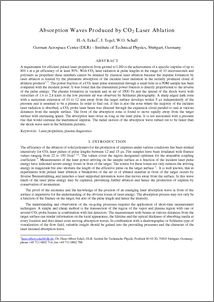Eckel, Hans-Albert und Tegel, Jochen und Schall, Wolfgang
(2006)
Absorption waves produced by CO<sub>2</sub> laser ablation.
In: High-Power Laser Ablation VI, 6261.
SPIE.
High-Power Laser Ablation, 2006-05-07 - 2006-05-12, Taos Convention Center, Taos, NM, USA.
ISBN 0-8194-6326-4.
![[img]](https://elib.dlr.de/style/images/fileicons/application_pdf.png)  Vorschau |
|
PDF
649kB |
Kurzfassung
A requirement for efficient pulsed laser propulsion from ground to LEO is the achievement of a specific impulse of up to 800 s at a jet efficiency of at least 50%. With CO<sub>2</sub> laser radiation at pulse lengths in the range of 10 microseconds and polymers as propellant these numbers cannot be attained by classical laser ablation because the impulse formation by laser ablation is limited by the premature absorption of the incident laser radiation in the initially produced cloud of ablation products. The power fraction of a CO<sub>2</sub> laser pulse transmitted through a small hole in a POM sample has been compared with the incident power. It was found that the transmitted power fraction is directly proportional to the inverse of the pulse energy. The plasma formation in vacuum and in air of 3500 Pa and the spread of the shock wave with velocities of 1.6 to 2.4 km/s in the low pressure air was observed by Schlieren photography. A sharp edged dark zone with a maximum extension of 10 to 12 mm away from the target surface develops within 5 μs independently of the pressure and is assumed to be a plasma. In order to find out, if this is also the zone where the majority of the incident laser radiation is absorbed, a CO<sub>2</sub> probe laser beam was directed through the expansion cloud parallel to and at various distances from the sample surface. The front of the absorption zone is found to move rapidly away from the target surface with increasing speed. The absorption lasts twice as long as the laser pulse. It is not associated with a pressure rise that would increase the mechanical impulse. The radial motion of the absorption wave turned out to be faster than the shock wave seen in the Schlieren pictures.
| elib-URL des Eintrags: | https://elib.dlr.de/46072/ |
|---|
| Dokumentart: | Konferenzbeitrag (Vortrag, Paper) |
|---|
| Titel: | Absorption waves produced by CO<sub>2</sub> laser ablation |
|---|
| Autoren: | | Autoren | Institution oder E-Mail-Adresse | Autoren-ORCID-iD | ORCID Put Code |
|---|
| Eckel, Hans-Albert | NICHT SPEZIFIZIERT | NICHT SPEZIFIZIERT | NICHT SPEZIFIZIERT | | Tegel, Jochen | NICHT SPEZIFIZIERT | NICHT SPEZIFIZIERT | NICHT SPEZIFIZIERT | | Schall, Wolfgang | NICHT SPEZIFIZIERT | NICHT SPEZIFIZIERT | NICHT SPEZIFIZIERT |
|
|---|
| Datum: | Mai 2006 |
|---|
| Erschienen in: | High-Power Laser Ablation VI |
|---|
| Referierte Publikation: | Nein |
|---|
| Open Access: | Ja |
|---|
| Gold Open Access: | Nein |
|---|
| In SCOPUS: | Nein |
|---|
| In ISI Web of Science: | Nein |
|---|
| Band: | 6261 |
|---|
| Herausgeber: | | Herausgeber | Institution und/oder E-Mail-Adresse der Herausgeber | Herausgeber-ORCID-iD | ORCID Put Code |
|---|
| Phipps, Claude | NICHT SPEZIFIZIERT | NICHT SPEZIFIZIERT | NICHT SPEZIFIZIERT |
|
|---|
| Verlag: | SPIE |
|---|
| Name der Reihe: | Proceedings of SPIE |
|---|
| ISBN: | 0-8194-6326-4 |
|---|
| Status: | veröffentlicht |
|---|
| Stichwörter: | Laser propulsion, plasma diagnostics |
|---|
| Veranstaltungstitel: | High-Power Laser Ablation |
|---|
| Veranstaltungsort: | Taos Convention Center, Taos, NM, USA |
|---|
| Veranstaltungsart: | internationale Konferenz |
|---|
| Veranstaltungsbeginn: | 7 Mai 2006 |
|---|
| Veranstaltungsende: | 12 Mai 2006 |
|---|
|
Veranstalter
: | SPIE |
|---|
| HGF - Forschungsbereich: | Luftfahrt, Raumfahrt und Verkehr |
|---|
| HGF - Programm: | Luftfahrt |
|---|
| HGF - Programmthema: | Starrflügler (alt) |
|---|
| DLR - Schwerpunkt: | Luftfahrt |
|---|
| DLR - Forschungsgebiet: | L AR - Starrflüglerforschung |
|---|
| DLR - Teilgebiet (Projekt, Vorhaben): | L - Laserforschung und -technologie (alt) |
|---|
| Standort: |
Stuttgart
|
|---|
| Institute & Einrichtungen: | Institut für Technische Physik |
|---|
| Hinterlegt von: |
Eckel, Dr.rer.nat. Hans-Albert
|
|---|
| Hinterlegt am: | 08 Dez 2006 |
|---|
| Letzte Änderung: | 24 Apr 2024 19:08 |
|---|
Nur für Mitarbeiter des Archivs: Kontrollseite des Eintrags